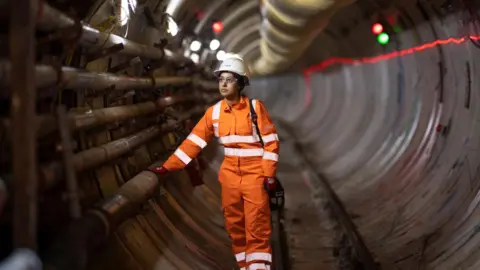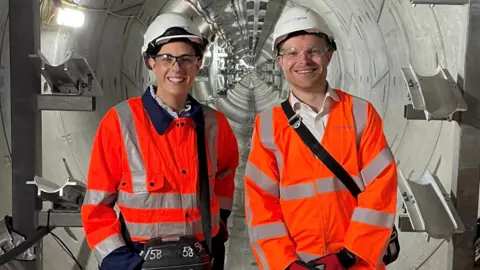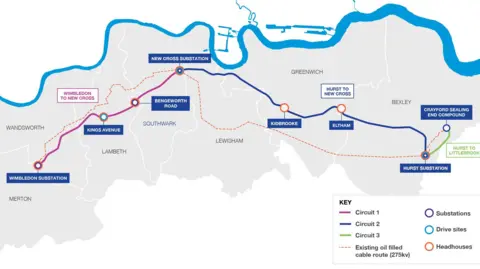London's newest electricity tunnel powers up
 National Grid
National GridNew electricity transmission circuits built under London have been switched on as part of a £1bn project to rewire south London via underground tunnels.
One and a half miles (2.5km) of high voltage network went live between Hurst substation in Bexley and Crayford, securing the supply of electricity to thousands of homes.
The previous cables were reaching the end of more than 50 years of operation, having been commissioned in 1967, National Grid said.
The new energy infrastructure is part of a project to build more than 18 miles (29km) of tunnels under London to "upgrade and futureproof" the capital’s electricity supplies.
 National Grid
National GridAlice Delahunty, president of National Grid Electricity Transmission, said: "There’s still a way to go on the project, but the Hurst-Crayford circuit seeing volts for the first time is a tremendous achievement for our National Grid teams and supply chain partners.
“It’s hard to overstate what an engineering challenge it has been to build over 20 miles of tunnels under London to upgrade and futureproof the capital’s electricity supplies, so the project’s progress to date is a real testament to all those involved.”
'British infrastructure at its best'
Energy minister Michael Shanks welcomed the new energy infrastructure during a visit to New Cross substation.
He said: “The London Power Tunnels show British infrastructure at its best and I congratulate the efforts of everyone involved, as this new circuit switches on to power up homes and businesses across the capital.”
Work is ongoing on two more major projects: a 7.4-mile (12km) tunnel between Wimbledon substation and New Cross and an 11-mile (18km) tunnel linking New Cross and Hurst.
They form part of National Grid’s £1bn London Power Tunnels 2 (LPT2) project.
Also under construction is a new substation at Bengeworth Road in Denmark Hill.
Most of the electricity supply in south London is currently transmitted through underground cables just below the road surface. Work to maintain them is carried out at street level, which National Grid said could be disruptive.
 National Grid
National GridIn total, just over 20 miles (32.5km) of 10ft (3m) diameter tunnels are being built deep below the road network between Wimbledon and Crayford, which will carry high voltage electricity cables.
The project follows the completion in 2018 of a seven-year £1bn project to construct tunnels and two new substations to rewire the network in north London.
Listen to the best of BBC Radio London on Sounds and follow BBC London on Facebook, X and Instagram. Send your story ideas to [email protected]
